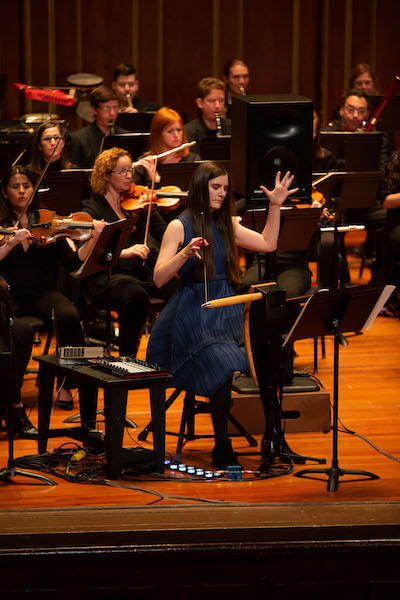Oooh-weee-oooh: BMOP opens season with premiere of theremin concerto

With a sound that mimics the human voice, the theremin has a myriad of rich and varied expressive possibilities. Yet only in recent years have composers begun to explore its potential as a solo concert instrument in earnest. Following in the footsteps of Joseph Schillinger and Anis Fuleihan, composers such as Kalevi Aho, Régis Campo, Andrew Norman, and Carolina Eyck have penned concertos that explore the lyrical capabilities of this truly unusual instrument.
Dalit Warshaw joins that company with Sirens, a new concerto for theremin and orchestra that Gil Rose and the Boston Modern Orchestra Project offered in its world premiere at their season-opening concert at Jordan Hall Friday night.
A theremin performer of renown herself, Warshaw crafted Sirens as a miniature narrative about the people who have played a significant role in the instrument’s one-hundred-year history. She constructed the three-movement work from themes that stand for the first major theremin virtuoso Clara Rockmore, her sister Nadia, and Warshaw herself, all of who are connected through a series of teacher-pupil relationships to the instrument’s inventor, Léon Theremin. The world of the unique electronic instrument, the concerto seems to suggest, is a small one.
But in effect, Sirens, which lasts about twenty-five minutes,is a showpiece for the instrument’s strange and alluring timbre. Warshaw cleverly weaves her themes into a bright tapestry of orchestral sound, over which the theremin offers lyrical commentary. Colorful effects, such as harp glissandos and the rush of wind as players blow air through their instruments, fill the first movement to the brim. The theremin is called upon to complement the ensemble with dusky cello-like sonorities and gleaming melodies that take the shape of a Verdi aria.
The second movement, entitled “Ulysses,” is like a film score without visuals. There, the theremin spins out a lonely cadenza that evokes the mystery of a siren’s song as described in Homer’s Odyssey. Solo violin and oboe then supply faint countermelodies that unfold into a lush orchestral texture.
The final movement is a fugue woven from the first movement’s themes. As the lines churn about in the orchestra, the theremin again offers poignant phrases that rise above the fray. Sirens comes to an end with a return to the rush of sounds that open the piece, and all fade into a serene silence.
The soloist for Friday’s performance was Carolina Eyck, who treated each phrase with the subtlety of a fine vocalist. Shaping her lines with wide dynamics, Eyck floated melodies in each movement that curved into graceful arcs before they faded into the orchestral forces. Throughout, Rose wove a delicate accompaniment that blended sensitively with her amplified instrument.
A similar simpatico partnership also marked Eyck and Rose’s performance of Joseph Schillinger’s First Airphonic Suite.
The first work to pair theremin and orchestra, Schillinger’s short suite from 1929 is a thoroughly romantic affair, complete with bold gestures, soaring melodies, and surging climactic passages.
Friday’s vivid performance opened with chant-like phrases in the bassoons, over which Eyck spun a tender, flowing line. As the music progressed, woodwinds and brass, led by Rose’s brisk gestures, punctuated her phrases with thorny dissonances that brought a sense of urgency. But as in Warshaw’s concerto, Eyck’s melodies made for a smooth counterbalance to the energetic accompaniment, offering instead an eerie solace.
The rest of the program focused upon the music of John Alden Carpenter, an American composer who has fallen into undue neglect.
Like Charles Ives, Carpenter studied under a paragon of American romanticism (John Knowles Paine), found a unique voice by blending vernacular elements with bristly modern harmonies, and ended up spending his professional career working in business (Carpenter worked in his family’s Chicago-based shipping company).
He is remembered today for the ballet Skyscrapers (1926), which Rose led Friday night. At twenty-five minutes in length, Skyscrapers is a blazing essay for orchestra that wraps its parodies of jazz and blues melodies in prickly harmonies. Yet its quotations of Stephen Foster songs result in moments of sweeping grandeur, and in certain stretches the work suggests a Stravinsky retooling of E. P. Christy’s minstrel shows.
Skyscrapers has ultimately not aged well because of its sardonic pokes at issues of race, a popular trait in entertainment of the day. The ballet is most problematic in its concluding section, which calls upon a chorus to sing nonsense, Africanized lyrics. When heard today, the passage results in cultural appropriation of the worst kind.
Nevertheless, Rose and the orchestra offered a dazzling and insightful reading that mined the ballet of its vitality. With brisk gestures, the conductor navigated Carpenter’s shifting meters, brassy timbres, and climactic perorations. The ten-member chorus sang their parts with radiant tonal blend.
Carpenter’s ballet score for Krazy Kat, which opened the concert, showcased the orchestra in more subtle expressive moments.
Based upon a popular comic strip of the era, Krazy Kat, completed in 1922,is shot through with Broadway-style lyricism. The jazz elements, which culminate in a fox trot, add a humor and charm that have retained their currency. In each section of this short piece, Rose captured a sly wit by coaxing playing well attuned to the buoyancy and grace of once popular musical styles.
He did the same with Kurt Weill’s Little Threepenny Suite, shaping the melodies from this familiar score with appropriate schmaltz. In the swinging rhythms of “Mack the Knife,” the warm melodic strains of “Polly’s Song,” the zesty “Tango,” and in the mock seriousness of the “Finale,” BMOP’s small ensemble of winds, guitar, banjo, percussion, and piano played with the verve of a dance band.
Gil Rose will lead the Boston Modern Orchestra Project in music by Matthew Rosenblum, Wlad Marhulets, Osvaldo Golijov, and Avner Dorman 8 p.m. November 23 at Jordan Hall. bmop.org
Posted in Performances



